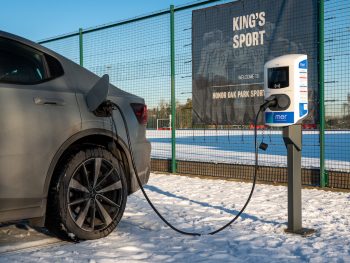Electric car range cut by up to a third in cold weather
Real-world range of electric cars could be nearly a third down on official figures in cold weather, new research suggests.

What Car? tested 12 EVs in identical winter conditions until they ran out of charge
While it’s common knowledge that cold weather impacts EV battery performance and efficiency, the tests by What Car? on a range of fully electric cars showed a shortfall in electric range from 16.2% to more than 30%.
The research was carried out on 12 electric cars, ranging in price from £31,995 to £69,425 and tested in identical winter conditions until they ran out of charge.
The worst performer was the Ora Funky Cat, which stopped after 130 miles – despite an official range of 193 miles, a shortfall of 32.8%.
Closest to its official range was the Nissan Ariya, which fell 16% short of its official figure, covering 269 miles rather than the 322 suggested.
The Tesla Model Y came second in terms of getting closest to its official range, recording a shortcoming of 17.8% from its official 331 miles.
“More and more people own or are considering electric cars, and it’s important that they understand the pros and cons of this technology, especially in terms of how far they are likely to go between charges,” explained Will Nightingale, who heads What Car?’s test team.
Acknowledging that discrepancies between official figures and real-world results are well known, the team also published further research to show the drop between summer and winter range in actual usage.
Three of the 12 test cars – the Cupra Born, BMW i4 and Tesla Model 3 – were tested on the same test route and in the same conditions in July 2022. The comparison of these results with the new figures gives more representative figures of the fall in winter range.
The trio’s average range was 18% lower in winter, with the BMW faring worst (261 miles vs 317, a fall of 21.6%) and the Tesla doing best (272 miles vs 304, a fall of 11.8%). The Cupra covered 182 miles, against 219 in summer, a fall of 20.6%.
What Car? noted that even with the drops in range, the cost of running an electric car still came out less than a typical petrol or diesel equivalent, based on home charging prices.
“Despite falling short of their official figures, it’s still clear that many of these electric cars have the advantage of being cheaper to run than petrol or diesel equivalents assuming you can charge at home – even with the price of electricity so high at the moment. The most efficient, the Mini Electric, cost just 8.7p per mile to fuel. The most efficient petrol car we’ve ever tested, a Toyota Yaris, costs 11.2p a mile at today’s prices,” added Nightingale.
What Car? Real Range testing
What Car? Real Range test – real-world winter range vs official range
| Car | Official range (miles) | Winter test range (miles) | Shortfall |
| Nissan Ariya 87kWh Evolve | 322 | 269 | 16.4% |
| Tesla Model Y Long Range | 331 | 272 | 17.8% |
| Mini Electric Resolute | 141 | 113 | 20.2% |
| Genesis GV60 Premium | 321 | 251 | 21.8% |
| BMW i4 eDrive40 M Sport (Pro Pack) | 340 | 261 | 23.4% |
| Jaguar I-Pace EV400 | 261 | 197 | 24.6% |
| Volkswagen ID Buzz Style | 255 | 192 | 24.8% |
| MG 4 Long Range Trophy | 270 | 196 | 27.6% |
| Cupra Born 58kWh V3 | 255 | 182 | 28.7% |
| Renault Megane E-Tech Techno | 270 | 189 | 29.9% |
| Renault Megane E-Tech Equilibre | 275 | 187 | 32.1% |
| Ora Funky Cat First Edition | 193 | 130 | 32.8% |
What Car? Real Range test – winter vs summer
| Car | Winter range (miles) | Summer range (miles) | % fall |
| Tesla Model Y Long Range | 272 | 304 | 11.8% |
| Cupra Born 58kWh V3 | 182 | 219 | 20.6% |
| BMW i4 eDrive40 M-Sport Pro Pack | 261 | 317 | 21.6% |
The full What Car? findings and specific of the test conditions are here.













Michael Fallquist30. Mar, 2023
Proper heating in these vehicles is key when it comes to sustainability during the winter months. Thanks for sharing piece on EVs, which definitely are becoming more commonplace as time goes on.